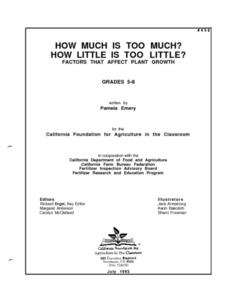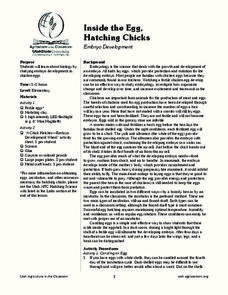National Center for Case Study Teaching in Science
A Deadly Passion
Depending on the level of maturity of your class, the case study presented here could be fascinating. It focuses on the mating behavior and post-mating rituals of the Australian redback spider, which involves the female eating the male...
Curated OER
Planting the Seed
Students plant their seeds and collect and organize their own materials for planting. They also set up their planters with wicks, fertilizer, potting mix, and seeds. Finally, students write their names on planter markers with a ball...
Curated OER
How Much Is Too Much? How Little Is Too Little?
Learners perform a series of experiments which show that plants require nutrients in certain quantities. They also cooperatively read materials on the nutrient requirements of plants, fertilizers, composting, and soil management, and...
Curated OER
Inside the Egg, Hatching Chickens
Students explore how an egg becomes fertilized. In this biology lesson, students "candle" a variety of eggs in order to determine which ones have been fertilized and which ones haven't. Student use paper plates to create a graphic on the...
Curated OER
WHAT'S ORGANIC?
Young scholars explore how certain foods come to be certified "organic." They write the words "organic" and "synthetic" and given the definitions of each. Students are given dictionaries. They are asked: "What is organic food?" Young...
Curated OER
Pea Soup Ponds
Students perform an experiment where they learn how water can be polluted by algal bloom. They grow algae with different concentrations of fertilizers or nutrients and analyze their results.
Curated OER
How Does Chance Influence Inheritance?
Students observe how chance affects which genes appear in gametes (Mendel's Law of Segregation). They use beans to represent the recombination of alleles during fertilization.
Curated OER
Making a Mini Worm Habitat
Students explore the process of converting organic waste into usable fertilizer. They observe how living and nonliving things interact with one another by making a mini-worm habitat.
Curated OER
Plants And Pollination
High schoolers describe sexual reproduction in plants, including the process of pollination, how insects assist in pollination, and how pollination differs from fertilization. They also explore the importance of honey bees to Arizona...
Curated OER
Modeling Allele Distribution Through Meiosis and Fertilization
The main objective of this activity is to illustrate the variation that results from crossing-over during prophase I of meiosis. Other sources of variation from generation to generation are: (1) independent assortment (223 possible...
Curated OER
What Kind of Garden Would Grow in Our Schoolyard?
Students perform soil tests for pH, nitrogen, phosphorus, potassium, composition and water percolation rate and assess the conditions in the schoolyard.
Curated OER
EGG MAZE: COUNTING BY TWOS, THREES AND FIVES
Students successfully count by twos, threes and fives, using pictures of eggs and poultry as points of interest. They orally review the types of counting (twos, threes, or fives). Students are introduced the idea of a dozen eggs.
Curated OER
SOIL
Second graders name the various materials that comprise soil, including weathered rock and other organic matter; and explain that soils differ in their color, texture, capacity to retain water, and ability to support the growth of many...
Curated OER
Pass It On
Students define terms, explain the relationship between sexual reproduction and meiosis and describe the process of meiosis. They view and identify phases of meiosis using a microscope and slides. They create a flipbook illustrating the...
Curated OER
The Roots of American Culture
Students explore the notion of culture and the influence of Latino culture on the U.S. They work in small groups to identify ways that Latino and non-Latino U.S. cultures have engaged in cultural 'cross-fertilization.'
Curated OER
The Effects of "Recreational" Drugs on the Development of Chick Embryos as a Model for Human Embryogenesis
Learners conduct experiments on fertilized chicken embryos to determine the possible developmental effects that various recreational drugs (caffeine, alcohol, nicotine, and aspirin) might have on them.
Curated OER
Vermicomposting
First graders investigate composting. For this biology lesson, 1st graders identify ways to use garbage as fertilizer. Students examine soil and compost matter as well as the role of worms in the dirt.
Curated OER
Finding Your Way On the Farm
Third graders explore the food industry by viewing a presentation about farming. In this farming geography lesson, 3rd graders view globes and maps while identifying the prime geographical locations for fertile land. Students view a...
Curated OER
How Does Your Garden Grow?
Students examine birdseed to see if it is a fertilized seed. In this birdseed garden lesson, students experiment with birdseed on a sponge to see what grows. Students record the growth of seeds.
Curated OER
Nature's Recycling Program
Students identify what materials make up compost. In this science of recycling lesson, students explain the benefits of composting determine how compost is a good plant fertilizer.
Curated OER
Making A Face
Learners are introduced to the cellular machinery assorts the pairs of chromosomes randomly and independently during meiosis. They are introduced to the rich genetic variation occurs as a result of the random and independent assortment...
Curated OER
Fertilizers, Pesticides and Human Health- American Lessons
Students explore migration and why people move. They explore the movement of native populations. Students explore the economy as an factor in migration. They discuss the exploitation of the migrant worker.
Curated OER
Growing a Garden
Students research aspects of gardening including nutrition, costs, and soil preparation. They then write a report detailing the planning of the garden and compare costs to buying the items.
Curated OER
Sustainable Agriculture
Students perform an experiment to find out if plants grow best when grown in soil with no fertilizer, with chemical fertilizers, or with compost that they have made themselves. Students discover how agriculture practices can benefit the...
Other popular searches
- Fertilizer Chemistry
- Fertilizer Effect
- Fertilizer Rate Calculation
- Soil Fertilizer
- Irrigation and Fertilizer
- Chemical Fertilizer
- Fertilizer Lesson Plans
- Lawn Fertilizer
- Chemistry of Fertilizers
- Fertilizer Lesson Pl Ands
- Plants and Fertilizers
- Chemistry Fertilizers























